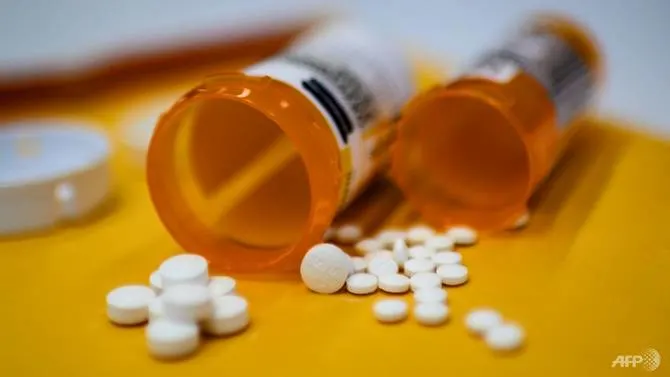Drug companies reach settlement ahead of landmark US opioids trial
22 October, 2019

Three leading American drug distributors and an Israeli drug manufacturer blamed for a deadly US opioid epidemic settled a bellwether civil lawsuit with two Ohio counties on Monday (Oct 21), just hours before they were to go on trial, a federal judge announced.
The US$260 million deal set the basis for a broader potential multi-billion dollar payout to some 2,700 addiction-ravaged communities nationwide who had signed on to the Cleveland lawsuit, the first in a federal court to address the causes of the crisis.
Officials of Ohio's Summit and Cuyahoga counties - which include the cities of Akron and Cleveland - said they would be able to almost immediately begin boosting funds to address the massive fallout from the crisis.
The addiction epidemic has placed huge burdens on hospitals and emergency services, and on families supporting addicts and caring for children with addicted parents or parents who have died.
"Cuyahoga County has seen thousands of people die over the last several years. It's a tragedy. Summit County is no different," said Cuyahoga prosecutor Michael O'Malley.
"Our hearts go out to the families who have been touched by this," said Ilene Shapiro, the chief executive of Summit County.
"Whatever we can do to help these families rebuild and get as healthy as they can and move foreward is what we are trying to do."
HUNDREDS OF THOUSANDS OF DEATHS
The settlement involved the three leading US drug distributors, some of the largest companies in the country - Cardinal Health, Amerisource Bergen, and McKesson Corp.
It also included Israel's Teva, one of the world's largest generic drug manufacturers.
Pharmacy chain Walgreens opted out of the deal and will go to trial at a later date, said Federal District Judge Dan Polster. A small Ohio distributor also settled in a separate deal.
A trial would have examined allegations that the makers of the prescription painkillers and pharmaceutical distributors pushed billions of pills into communities without due care over two decades, making it excessively easy for patients to become addicted and creating a permanent demand.
The companies reaped tens of billions of dollars in profits while overdose deaths soared above 400,000 over two decades - more than 70,000 in 2017 alone.
Plaintiffs had amassed large amounts of evidence showing that the companies knew they were fomenting an epidemic of addiction.
Lawyers had brought in addicts and family members of addicts to testify how they had quickly become addicted to the easy-to-obtain, overprescribed painkillers.
The deal, though, does not require the companies to admit wrongdoing.
"While the companies strongly dispute the allegations made by the two counties, they believe settling the bellwether trial is an important stepping stone to achieving a global resolution and delivering meaningful relief," the three giant distributors said in a statement.
The prospects of more litigation sent the shares of the three distributors tumbling. AmerisourceBergen fell 3.4 per cent, McKesson lost 3.2 per cent, and Cardinal Health lost 2.2 per cent.
Teva gained 8.8 per cent on the relatively small cash payout it will make to the two countries, US$20 million.
Walgreens meanwhile lost 1.5 per cent as it planned to fight in court.
TALKS CONTINUE
Talks continued with the broader group of plaintiffs for a settlement likely worth tens of billions of dollars in cash and in-kind payments, mainly free drugs for treating addiction.
Negotiations for a global deal worth a reported US$48 billion - but only US$18 billion in cash - broke down on Friday amid differences between some states and smaller communities over the total value and how the money would be distributed.
Officials of four states who had backed the tentative deal on Friday called the two-counties deal "an important step" but said a global settlement could take weeks.
"The global resolution on the table will distribute funds fairly between states, counties and cities while also ensuring that these companies change their business practices to prevent a public health crisis like this from ever happening again," said the attorneys general of North Carolina, Tennessee, Pennsylvania and Texas.
Major drug manufacturers and distributors have already struck deals worth billions of dollars with states and local governments around the country to compensate them for the costs of the epidemic.
A study by the Society of Actuaries estimated that the opioid epidemic cost the US economy at least US$631 billion from 2015 to 2018.
In August Purdue Pharma, the producer of OxyContin, one of the leading painkillers driving the addiction epidemic, reached a deal with 29 states and territories to compensate them.
Purdue said the deal would cost it US$10 billion and force it into bankruptcy, but critics in states and localities that opposed the deal say it is worth much less, and demanded the family that built Purdue, the Sacklers, pay billions more out of their own fortune.
In an Oklahoma trial in August, drug maker Johnson & Johnson was ordered to pay US$572 million to compensate the state.
The company then reached a separate deal in the Cleveland case to pay the two counties US$20.4 million.
